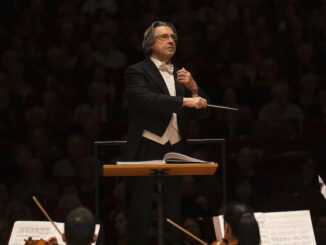
On June 27th, 2019, in a Special Concert that was repeated on June 28thand 29th, the Chicago Symphony Orchestra (CSO) closed its 128th Season with a stellar performance of Harry Potter and the Prisoner of Azkaban in Concert. American conductor Emil de Cou led the CSO and the Women of the CSO Chorus were directed by Benjamin Rivera as the deeply engaging film played out on a giant screen behind and above the Orchestra. The Chorus reposed and stood at stage left; their scores and the Maestro’s were lit, and the reflections added an appropriately spectral glow to the production.
De Cou, currently Music Director of Pacific Northwest Ballet, is also Principal Conductor for the National Symphony Orchestra’s Wolftrap performances as well as musical consultant for NASA. He’s an expert at conducting concert dance, film scores sans click tracks- no mean feat- and is thus thoroughly well versed in the music of legendary American composer John Williams, 87.
De Cou has referred to Williams as “The greatest composer in film history” due in part to the nature of the movies he’s worked on. “Through his music, he and collaborators like Steven Spielberg have created modern fables and fairytales”, said De Cou. Stop to consider scenes from some of Williams’ great film collaborations: the suspense created when we hear the alternating pattern of two notes that anticipate the great white shark in Jaws, or the sparkling percussive theme of the bicycle ending in E.T.
Americans love movies, especially blockbuster tales with heroes, and most of us can vividly recall the characters and plots of our favorites. But most people cannot call to mind the music to the screenplays of our lives. Nonetheless, when one sees an image that will become iconic, when one hears a superb accompanying melody, it becomes embedded in the mind and one can reinforce the other. Just think, then, how impressive it was to hear an Orchestra of the caliber of the CSO performing a wealth of surpassingly memorable sound like the instant score! The audience was incorporated into the story and the story was borne along by the music.
The CSO, De Cou in suave and utter control at the podium, presented a tale of mystical, magical events, wonky pedagogy, enduring friendship and near-miss triumph over evil, all with a sinister and threatening edge via this terrific film score. Opening with the tinkling finely wrought celesta strains of Hedwig’s Theme, the plot and score quickly take on a decidedly deep dark cast, elevating the level of danger with the music actually leading rather than embellishing the action.

Director Alfonso Cuarón and cinematographer Michael Seresin have given viewers a plot that takes us from Harry’s unhappy foster home life back to Hogwarts Wizardry School accompanied by a vision of escaped prisoner Sirius Black, who carries with him a connection to the demise of Harry’s lost magician parents. Twisting and turning through numerous challenges, the saga sees Harry growing into more mature powers, locked into comradeship with Hermione, “The Best Young Witch of Her Generation”. With her uncanny ability to slice to the heart of phoniness vs. truth, together they guard their classmates, teachers and the school, ultimately working through an indelible time shift to rescue a stunning horse/bird. They move steadily upward, penetrating a zenith of scholarship with unusual new tutors, all the while refining and redefining the notions of friend/foe, self/parent, and idols/werewolves.
The music soars above and goads the action, crafting a soundscape of energizing depth and rich emotional texture. Characterized by a few familiar amid many new themes, moments of pure shining lyricism, and fanciful trajectories, the sounds are no longer that of a sweetly imaginative children’s universe. Aunt Marge’s Theme, in which the great CSO strings seem to smirk and flirt, is a weirdly playful piece, in contrast to The Knight Bus, an almost hyperactive jazzy work. Double Trouble is a mesmerizing incantatory brew, sung here by the glorious voices of the Women of the Chicago Symphony Choir, creating spellbinding effects with Shakespeare’s lyrics brought forth in a Gregorian chant styled syncopation. The Choir was also breathtaking in The Petronius Light, sounding like fallen angels chanting.
The hypnotizing CSO drums and all of the percussion effects were especially effective, pounding out the opening beat in Buckbeak’s Flight, adding to the intense special effects in The Werewolf Scene, infusing the entire film with a glorious interplay between timpanic chimes and- in particular- the wonderful CSO woodwinds. The harp was also used to fantastic advantage in this score filled with the wonders of growing up, the poignancy of losing friends, and the longing for one’s forebears. Finally, I’d be remiss if I failed to mention the outstanding CSO flutes, in solo, and grouped in A Window to the Past, during which they grant a subtle medieval sense of place and presence.
De Cou is a confident and elegant presence; he seemed to relish encouraging and capturing the varieties of expression and whimsy. Notably vibrant were his sweeping gestures during The Portrait Gallery, filmed at Britain’s National Portrait Gallery. While oddball persons are highlighted inside the paintings on the walls, De Cou literally brings them to life with the efficient clarity of his tempo and harmonizing direction.
This was a transcendent effort, capturing first the minds and then the hearts of the audience, and carrying along the fine actors and actresses as they encounter tribulations and success. We were swept by the virtuosity of Orchestra, singers, and Conductor/Chorus Director into a universe that ranged from subdued motifs and angelic breathy vocalizations through symbolic menacing vibes.
For information and tickets to all the great programming of The Chicago Symphony Orchestra, go to www.cso.org




Be the first to comment